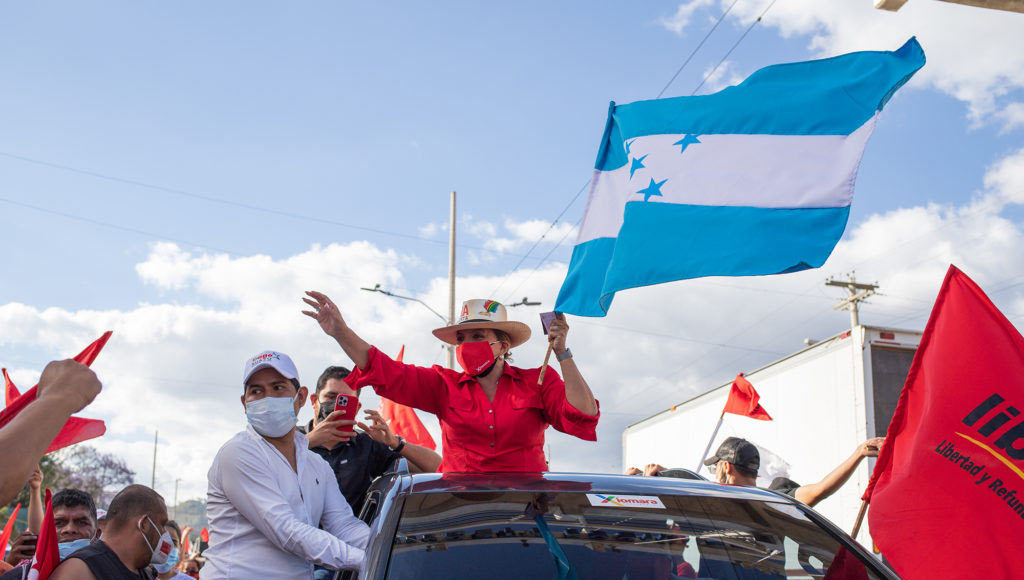
When Honduras’ first female president Xiomara Castro rose to power under a feminist agenda, women all over the country were filled with hope. But a hundred days into her government, with not a single change introduced that benefits women, pressure is mounting for Castro to fulfil her promises.
Vienna Herrera, an investigative multimedia journalist with Honduran digital media outlet Contracorriente focuses on gender issues, sexual and reproductive rights, extractivism, the environment, and power structures.
Vienna has reported on women’s rights issues for many years. She was part of the team who worked on the Gabo Award-winning special feature ‘Tierra de resistentes’, which documented organized threats against environmental activists. She also participated in transnational features like ‘Estación del Silencio’ with El Salvador’s El Faro, about Mesoamerican violence against women, and ‘Interrupción del embarazo, la deuda de Centroamérica con las mujeres’, led by Agencia Ocote of Guatemala in collaboration with six Central American media outlets. Her other work includes ‘Las muertes evitables’, a feature on maternal mortality during the pandemic in Mexico, Guatemala, Honduras and El Salvador.
For Voz IIII, she turns to her home country Honduras to look at the shortcomings of Xiomara Castro’s first 100 days in office and the lack of action on women’s rights issues – a fight close to her heart.
Voz brings our loyal subscribers a long-read article each quarter, conveying the experience and analysis of our partners: activists, journalists, artists and academics. We hope that their in-depth testimony and commentary will help broaden our understanding of Latin America, and through it, the world.
When Xiomara Castro was announced the winner of the Honduran presidential elections in November 2021, I had spent the past four years writing about violence against Honduran women and our reproductive rights. I covered stories that really broke me, where the patterns of impunity were clear and I had to cope with accompanying families of femicide victims and listening to women who have survived femicide attempts and sexual assaults. I allowed myself a moment’s respite.
Xiomara Castro is the first female president, and she’s come to power promising a feminist agenda, a government plan that includes the decriminalization of abortion on three grounds, and allows the legal distribution of contraceptives and the morning after pill, prohibited in Honduras since 2009.
‘Women, I will not let you down’, she repeated in every campaign speech. And it was with this same phrase that she closed her inauguration ceremony on 27 January. The joy of many women from the feminist movement present that day was evident, as green handkerchiefs appeared among the Honduran national flags and the red flags of Castro’s Libertad y Refundación (Liberty and Refoundation) party.
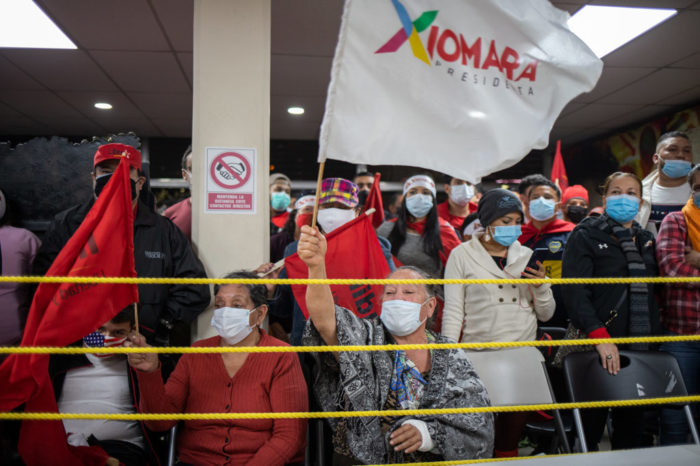
These promises made to women had earned Castro a hate campaign against her during the election from the opposing Partido Nacional who were in power at the time. They staged protests with pro-life placards depicting Castro attacking a pregnant woman with a knife, and they even erected billboards stating ‘Honduras is pro-life’.
Women, I will not let you down
The topic of reproductive health was clearly crucial to Castro’s campaign. She got more votes than any other candidate in the history of Honduras, but to do this, she had to win over the many young people who usually abstained. She did this mostly through progressive speeches. Social media and WhatsApp groups were flooded with memes in reference to this when Castro won, from young members of the LGBTIQ+ community saying that they would feel safer now and, above all, from women happy to have a feminist president.
Legalizing emergency contraception
In Honduras the use, sale and distribution of the morning after pill has been prohibited since 2009. The ban was introduced a few months after a de facto government, established after the coup d’etat, took power – on the pretext that it is ‘an abortive pill’. Now, 13 years later, the number of cases of sexual assault registered in Honduras has doubled and women seeking medical attention in these cases have no way of choosing to prevent an unwanted pregnancy.
So 8 March 2022 seemed like the perfect chance for Xiomara Castro to fulfil one of the promises she made during her campaign: to repeal this law and allow for emergency contraception to be distributed legally again. This is an essential step in order to establish a protocol for the care of survivors of sexual violence. In Honduras, health centers receive women who have been assaulted, yet there are no protocols in place. This has allowed for revictimization and poor care.
As Castro entered the Presidential Palace in Tegucigalpa, various feminist organizations held a feria de la salud (health fair), gave out information, carried out free examinations and collected signatures to hand in to the president. Hours later, they managed to present more than 390,000 signatures supporting the legalization of emergency contraception.
‘After over 12 years of being subjected to a patriarchal and capitalist system and a regime that exploits our bodies; having the space, albeit symbolic, to hold a health fair and talk about emergency contraception in the Presidential House, was historic,’ says Sofia Vindel, a young activist of the Somos Muchas platform.
Sofia smiles behind her face mask as she recalls the excitement that day: ‘We went feeling safe in the knowledge that they weren’t going to repress us, that we could shout out whatever slogans we wanted, and at least that time we could be sure there would be no tear gas. We won back the freedom to protest, which had been taken away from us over the years’, she says, referring to the period of government under former president Juan Orlando Hernández. This was an extremely violent period, where social protest of all kinds was heavily repressed. Hernández remained in power for eight years, four of those after an unconstitutional re-election, and was recently extradited to the United States for three crimes related to drug trafficking.
A promise to women
Karol Bobadilla, an activist with Somos Muchas in the department of Cortés, Honduras’ second-largest city, says that 8 March was an encouraging moment for the feminist movement: ‘Our generations grew up in a time of dictatorship, so the way we’re accustomed to working has been shaped by the last 12 years, which have been very narrow, closed, and repressive.’
If women have a small opening to be heard now, that was something unimaginable under the previous government. Feminists who were authorities on the gender situation in the country today occupy important positions in the government, which has given hope to other women in the movement. However, the excitement and hope for rapid change have quickly diminished since 8 March, because President Castro has not fulfilled these women’s demands.
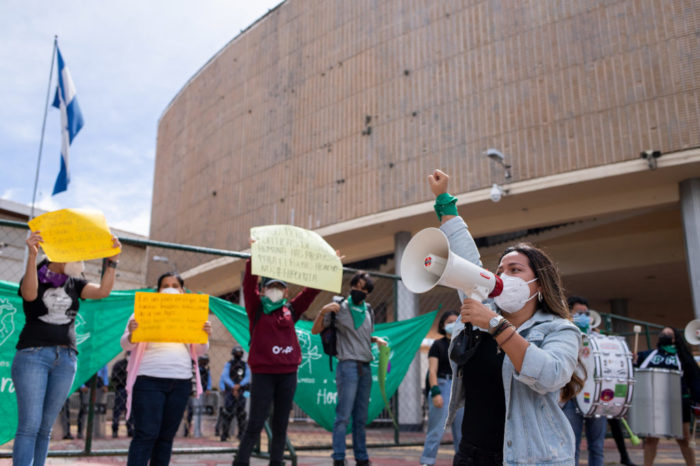
Jessica Sanchez, a feminist analyst, says that although it is a symbolic achievement for a female president to invite other women, especially feminists, into the Presidential House, ‘Not all of us were there. The oldest members of the feminist movement were there, but not the Indigenous, Afro-descendant members, trans women, and domestic workers.’
Not all of us were there. The oldest members of the feminist movement were there, but not the Indigenous, Afro-descendant members, trans women, and domestic workers.
Regina Fonseca, from the Women’s Rights Centre and the delegation that was received by Castro, commented that the president accepted the petition in favour of emergency contraception and promised that she would pass it on to the Secretary of Health – because the Minister of Health, José Matheu is responsible for the matter.
‘We didn’t get to sit down with her or see her repealing the agreement in a council of ministers,’ explains Fonseca, ‘it was not like that. That makes us more ready to fight, to negotiate to make sure that the advances are substantive and that they repeal all the regressive measures taken over the past 12 years, so at least we can return to the situation we were in before the coup d’état in terms of reproductive health’.
A dubious alliance
During the week of 8 March, the Minister of Health made statements to the media assuring that the repeal of this agreement was not his priority. This is a Minister whom, according to feminist organizations, is deeply conservative. Castro came to power by entering into coalition with the very conservative Partido Salvador de Honduras (PSH). They signed an agreement which promised to give government positions to party members – including in the ministry of health, a position which was given to Minister Matheu.
After the coalition agreement was signed, members of the PSH told the media that promises such as abortion reform or emergency contraception were not part of the government’s programme, and that the alliance was ‘pro-life and pro-family’.
Although members of the Libertad y Refundación Party to which Castro belongs had declared that the government manifesto would remain intact in spite of the alliance, the truth is that there seems to be no political will to solve women’s problems. The president of the National Congress is Luis Redondo of the PSH, who was a deputy in the previous term. In 2021, a constitutional reform was approved, providing a ‘shield against abortion’ and making it difficult to achieve decriminalization by that route. He has said that he would rather resign his seat or die, rather than allow the decriminalization of abortion in Honduras.
Sanchez explains how ‘[Castro] really used the feminist movement, appropriating their slogans and struggles to position her campaign. Now I think her hands are tied by a bunch of people who have co-opted her and who don’t want to act. She can’t stop them without admitting that there are internal battles within the government – which would put her position in danger.’
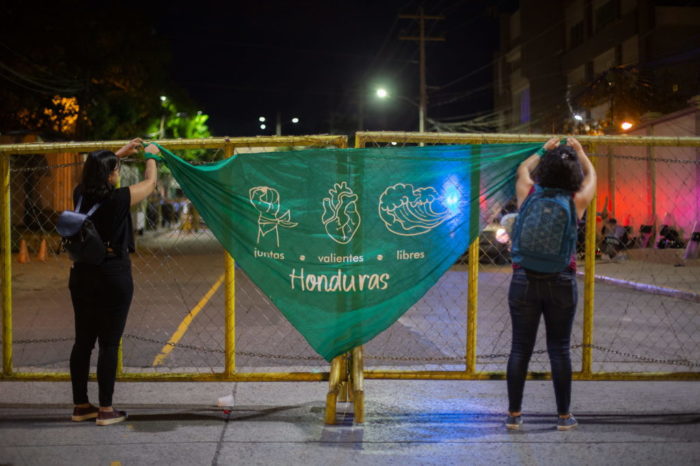
Gendered violence remains a widespread issue in Honduras
For Sanchez and many other women, it poses a real danger that Castro, having attained power, is backing away from several campaign promises such as emergency contraception and abortion. Many point out that although there have been high-profile cases of gender violence that have gone viral, Castro has not offered an opinion on the matter.
On 21 March this year, reports of the sexual assault of two women on the campus of a private university in Honduras went viral. Police arrested the perpetrator but the following day he was released, because in the initial hearing the survivors did not want to testify as they felt threatened by the aggressor’s family.
‘I believe this would have been a good opportunity for her to speak out because it is an agenda item, and the fact is that these two girls didn’t show up to court because they didn’t feel supported – not by the institutions, nor by the authorities,’ Sanchez explains.
In the first week of May there were two cases of misogyny and machismo within the government itself. In one incident, stones were thrown and tyres burnt outside the premises of Ciudad Mujer, a project created to work with women survivors of violence, or those who are in need of reproductive healthcare. The attack was partly instigated by a member of congress from the same party as Castro. It was directed at the head of the Ciudad Mujer programme, because she refused to appoint the person nominated by the congressman to a position in the organization.
The second incident was against the director of the Honduran Institute of Social Security (IHSS) who revealed that she had not been invited to a meeting of the board of directors, despite the fact that she heads that institution. A group of female employees walked out in solidarity with both officials, and said that they would not allow sexist and misogynist acts in Castro’s government. The president, however, made no statement on the matter, not even on social media. In fact, the following day, it was announced that the director of the IHSS had been dismissed and the media suggested that Castro herself was involved in this dismissal.
The president, after 100 days in office, hasn’t given one single press conference where she can be questioned. These recent events have led many to question her position. Many are asking why, during the first few months of Castro’s presidency, it was her husband Mel (former President Manuel Zelaya) who posed for the cameras on so many occasions and why he is now an official presidential advisor.
‘She needs to get out of her own spiral of violence. It’s suffocating her and stops her from seeing what’s going on. It’s a form of violence that we’re just identifying now within national politics. She needs to get out, away from Mel’s orders, and assume her own agency within the country – taking those actions that are directed towards women’s empowerment and the reduction of violence’, Sanchez affirms.
Femicide is difficult to curb
In November, when Castro won the elections, I went back to ask a number of women I had interviewed over the past four years about how the change of government was affecting them. I returned to one of the stories that had had a profound impact on Honduran society, for which there has still been no justice: the femicide of Keyla Martinez, a student nurse, in 2021.
Keyla died on 7 February after being arrested for breaking a curfew in La Esperanza, in the department of Intibucá. The National Police (PNH) claimed that Keyla had committed suicide in her detention cell. Forensic Medicine, however, determined that she was murdered, and an investigation was launched. So far only one suspect has been detained, but Keyla’s family says they still haven’t found those really responsible for the femicide.
When I spoke with Keyla’s mother Norma Rodriguez in December, she was in high spirits, hoping that the change in government would allow her to obtain justice. But after Castro’s first 100 days, Norma seems just as disillusioned as she was before. She says the only member of the government who has spoken to her is the Minister of Human Rights, despite the fact that the female Deputy Minister of Security stated she would investigate this case and all femicides.
‘To be honest I think all [the police] hide behind the same old excuses. Although supposedly there are people doing good things, if they were really honest they would demand a thorough investigation. I can’t see the police changing any time soon, and I only hope that someday someone will decide to speak out and tell us what happened in my daughter’s cell,’ says Norma, resigned to continue fighting alone, alongside the organization that supports her in her case.
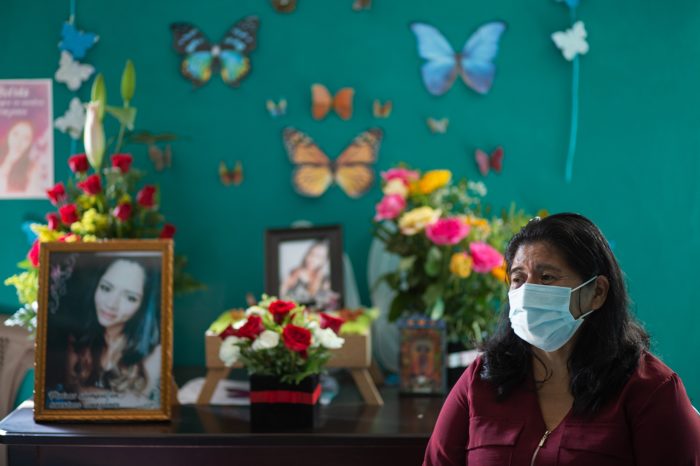
The Observatory of the organization Ecumenicas por el Derecho a Decidir has recorded a total of 101 femicides from January to the end of April 2022 – the same number in the same period as last year.
Jessica Sanchez adds that the government faces a huge challenge when it comes to femicide: ‘We inherited a criminal system in which women are the main target. So the government has the challenge of confronting organized crime, and a commitment to actions that will make a real difference between the old days and now,’ adds Sanchez.
If they don’t begin prioritizing women’s rights this year, they’ll see us in the streets, because they taught us that it’s in the streets that you take power. They’ll see us there.
Women, some of whom have waited with their demands and spent 12 years without a chance of being heard, feel that although the current government has given them some space and consideration, they haven’t seen any concrete actions yet. ‘That means that it’s not going to be so easy. It’s costing us, and it’s going to continue to cost us. We may have to face some disappointments,’ adds Fonseca.
Meanwhile, Sofia Vindel says they will not wait much longer to see their demands met, as the longer it goes on, the more women will suffer violence. ‘I don’t think we can be patient. If they don’t begin prioritizing women’s rights this year, they’ll see us in the streets, because they taught us that it’s in the streets that you take power. They’ll see us there,’ she concludes.
***

